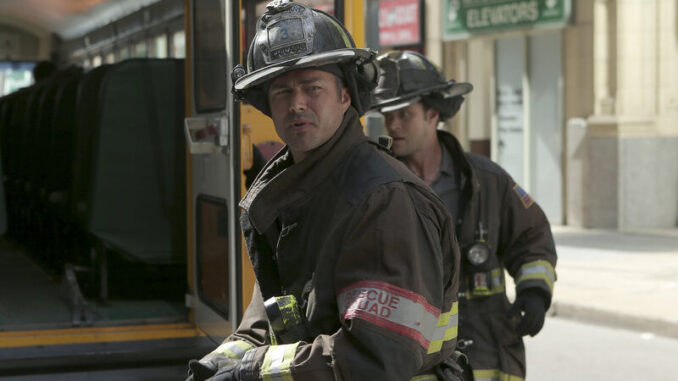
Behind the Smoke and Sirens: Unearthing Chicago Fire's Unseen Stories
From the moment the iconic sirens wail and the camera plunges into the heart of a raging inferno, Chicago Fire has captivated audiences with its high-octane drama, unwavering heroism, and the palpable camaraderie of Firehouse 51. For over a decade, we’ve watched Kelly Severide brave collapsing buildings, Stella Kidd climb the ranks, and Christopher Herrmann dispense wisdom and wit from Molly’s. But behind the perfectly choreographed chaos and emotionally charged performances lies a world fans rarely glimpse – a realm of unspoken bonds, hilarious mishaps, and profound personal connections that truly forge the show’s enduring magic. These are the whispers from the set, the stories etched not in the scripts, but in the very fabric of the cast’s shared experience.
One of the most frequently asked questions revolves around the cast’s chemistry: is it real, or just masterful acting? The truth, as any crew member will attest, is far more profound than mere camaraderie. It's a genuine, deeply rooted familial bond, forged not in the sunshine of easy friendship, but in the crucible of relentless schedules, emotionally draining storylines, and the sheer physicality of their roles. There are the "silent rituals" that define their mornings: Jesse Spencer and Taylor Kinney, despite their characters' intense storylines, often began their days with a specific, almost imperceptible nod and a shared, inside joke only they understood, a quiet acknowledgment of the long day ahead. Kara Killmer, ever the beacon of positive energy, had a habit of leaving small, encouraging notes in her co-stars' trailer mailboxes on particularly tough shooting days, often accompanied by a silly doodle. These aren't public gestures; they are the private acts of care that solidify a family unit, creating a psychological safety net that allows them to delve into the show's demanding emotional depths without reservation.
Beyond the visible stunts and special effects, there's a hidden layer of the physical toll the show takes, and the profound respect it breeds. While stunt doubles are invaluable, many of the actors insist on performing as much of their own "hero" work as safely possible. What fans don't see are the hours of fire training they undertake, not just for specific scenes, but as ongoing practice. Monica Raymund, during her tenure as Gabby Dawson, was known for her relentless pursuit of authenticity in every rescue, often pushing herself to exhaustion to ensure her movements were those of a seasoned paramedic. The "secret" here isn't just their athleticism, but the silent, mutual appreciation between the actors and the actual firefighters and paramedics who serve as their consultants. Off-camera, these real-life heroes often share harrowing personal stories, providing a weight and gravity to the actors' performances that goes far beyond any scripted line. It's not uncommon for a particularly intense fire scene to end with the cast and crew observing a moment of quiet reflection, the lingering smell of simulated smoke a stark reminder of the real dangers others face daily.
Yet, it’s not all gravitas and intensity. Long-running shows, particularly those with a dramatic core, require significant doses of levity to maintain morale. The set of Chicago Fire is reportedly a hotbed of good-natured pranks and spontaneous bursts of humor, many of which never see the light of day. Christian Stolte (Mouch) is the undisputed king of deadpan one-liners, often delivering them just as the camera cuts, sending his co-stars into silent fits of giggles that force multiple takes. Joe Minoso (Cruz) is known for his impromptu dance-offs in between scenes, often roping in unsuspecting crew members. The most legendary "secret" prank involved a meticulously planned "fake emergency" broadcast over the set's comms system, detailing a ridiculously improbable scenario that had a few new crew members genuinely scrambling before the entire cast burst into laughter, revealing the ruse. These moments of unadulterated silliness are more than just fun; they're essential pressure valves, allowing the actors to shed the heavy emotional weight of their characters before diving back into another life-or-death scenario.
Perhaps the most profound "secret" lies in the subtle ways the show's themes bleed into the actors' personal lives. The emphasis on loss, resilience, and the fragility of life inevitably shapes their perspectives. There are hushed conversations in corners of the set about how a particular storyline has made them reflect on their own loved ones, or how they’ve learned to appreciate the small moments more. When a character faces a personal tragedy, the supporting cast often steps up, not just as scene partners, but as genuine emotional support systems, ensuring their fellow actor feels truly held. These aren’t scripted gestures of empathy; they are the genuine reactions of individuals who have collectively navigated years of fictional crises, creating a shared understanding of life's unpredictable nature.
Ultimately, the true "secrets" behind Chicago Fire's enduring success aren't scandalous revelations or dramatic feuds. They are the quiet hum of a deeply connected family, the unyielding respect for the real-life heroes they portray, the joyful bursts of laughter that punctuate long days, and the subtle shifts in perspective wrought by portraying the ultimate first responders. These unseen stories, woven into the very fabric of the production, are the invisible threads that bind the cast, crew, and ultimately, the audience, to the heart of Firehouse 51, making it far more than just a television show – it's a testament to human connection forged in the heat of a shared purpose.
